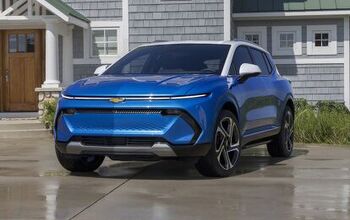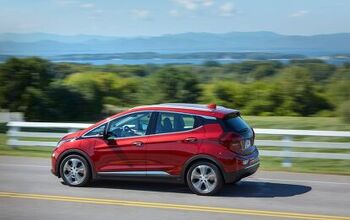Gas 2.0 Finds Huge Problem With EV Chargers: Their Badges

We thought we know all the problems that could face the plug-in EV. As there are cost, range, charge time, unavailability of charging stations for apartment dwellers, road tax, the unexpected emergency while the car is on the drip, and sundry others.
Gas 2.0, a site very sympathetic to anything that helps the “world coming to terms with its oil addiction,” found yet another problem that hadn’t even occurred to us:
“Let’s say I buy a Chevrolet Volt, and in a few years I sell my home to a Focus Electric owner. Sure, it should still charge your car, but do you want to charge your Ford with a Chevy charger?”
Why not? The Nissan Leaf, Chevy Volt, and Ford Focus Electric all share the mandated (US-) industry-standard five-prong Level 2 charging connector, in the industry lovingly referred to as the “SAE Surface Vehicle Recommended Practice J1772, SAE Electric Vehicle Conductive Charge Coupler.” (Developed by the Japanese Yazaki company, by the way.)
Sure, the wattage of the charging unit can be different, but it’s a free charger, no?
It’s a problem, says Gas 2.0:
“If you’re a member of Generation Y and you see a big ol’ Ford symbol glaring back at you every time you pull into your garage with your Nissan Leaf, it could conjure up memories of that time the family Ford Windstar broke down on your way to soccer practice. So do you replace it, or suffer through it?”
What’s wrong with those Gen Y types? This Boomer would go on the Internet. He would find out that the Ford Focus Electric uses a 6.6 kw 240-V charger, whereas the Leaf comes with a puny 3.3 kw 240-V charger. Just to be sure, this Boomer would ask whether the Ford charger will make the Leaf go boom. This Boomer would either hear that the Leaf charges faster than with the factory-issued charger, or that it will take the same time. But for Gas 2.0, it remains a problem. Although they concede that this problem will not “derail electric car acceptance.” Phew.
Don’t these guys have anything positive to say? They sure do. Gas 2.0 sings the praises of one company that shows great foresight in charger branding:
“It should be noted that the GM symbol is conspicuously absent from its “Voltec” home charger. Wise move, General.”
A true blue Ford Focus Electric owner will wrinkle his nose at the Voltec though: “My Ford charger does 6.6 kw, this thing does only 3.3!” Out goes the Voltec charger, in goes the Ford-tough charger. With the wiring already in place, a matter of less than an hour – if the previous owner didn’t skimp on the wire gauge.

Bertel Schmitt comes back to journalism after taking a 35 year break in advertising and marketing. He ran and owned advertising agencies in Duesseldorf, Germany, and New York City. Volkswagen A.G. was Bertel's most important corporate account. Schmitt's advertising and marketing career touched many corners of the industry with a special focus on automotive products and services. Since 2004, he lives in Japan and China with his wife <a href="http://www.tomokoandbertel.com"> Tomoko </a>. Bertel Schmitt is a founding board member of the <a href="http://www.offshoresuperseries.com"> Offshore Super Series </a>, an American offshore powerboat racing organization. He is co-owner of the racing team Typhoon.
More by Bertel Schmitt
Latest Car Reviews
Read moreLatest Product Reviews
Read moreRecent Comments
- ToolGuy TG likes price reductions.
- ToolGuy I could go for a Mustang with a Subaru powertrain. (Maybe some additional ground clearance.)
- ToolGuy Does Tim Healey care about TTAC? 😉
- ToolGuy I am slashing my food budget by 1%.
- ToolGuy TG grows skeptical about his government protecting him from bad decisions.

































Comments
Join the conversation
Do you really think a used electric car without a charger is worth anything, idiots. No point in hard wiring the charger if you ever plan to sell the car.
Maybe outside the subject, excuse me! The Chevy Volt has been tested in Sweden. It was -8 degrees celsius (17,6 F). The instrumentation indicated an all electric range of approx. 50 miles. The gas engine turned on after 900 meters and never turned off. The mileage for this great vehicle was approx. 23 MPG!!! Europe is full of similar diesel cars that easily gives 45 MPG!